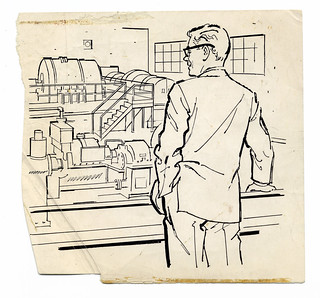 |
| Scan by Bart Solenthaler |
Not that the real subject of this piece is about anything as complex as that. It's been well summed up as being about rectangles. I am referring, of course, to the Apple vs Samsung patents case.
Anybody with even a basic knowledge of computer history will know that Apple basically borrowed the whole Macintosh look and feel from Xerox PARC research. And then claimed they invented it and tried to prevent anybody else from using it. Unsuccessfully, thankfully.
Now the battle is over the rather boring square shape of phones and tablets, as well as some simple but powerful software concepts around touch screen usage. It would seem that a surprising number of people think Apple invented the touch screen phone, which is not true. The first one we had as a test device was the Sony Ericsson P800, which was launched in 2002 and had such obvious things are tapping numbers and emails to activate them. The keyboard folded down to expose a much larger screen, or could be completely removed for those who had escaped candybar land.
My experience of the US Patent Office in particular was that even complex and genuinely original algorithmic concepts came back with an examiner's comment to the effect that it was obvious. So how come Apple's attorneys can get really obvious stuff, like making a tablet, well, rectangular accepted as a patent? This is what I don't understand. Nor can I understand some academics supporting claims of obvious things like one-figure scrolling with the P800 had in its browser years before Apple even made phones.
But the real concern is the impact on free thought, innovation and progress. Not to mention intellectual honesty and a desire to push the industry forwards.
I think it's time for Patent 2.0, but that's the subject of another post.

No comments:
Post a Comment